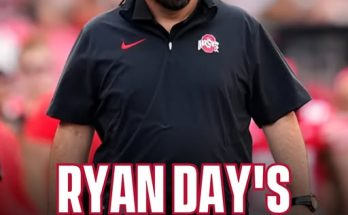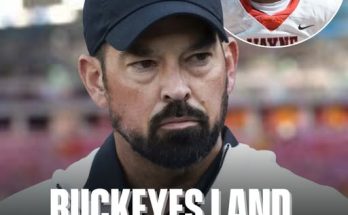Marc-Andre Fleury’s name has been synonymous with resilience, brilliance, and an enduring presence in the NHL for nearly two decades, but the recent twist involving his unexpected retirement and a surprising link to the Edmonton Oilers has left fans and analysts stunned. Known for his iconic tenure with the Pittsburgh Penguins, where he won three Stanley Cups, and later his Vezina Trophy-winning season with the Vegas Golden Knights, Fleury’s career has been nothing short of legendary. Yet, as news broke of his retirement, the underlying factors that led to this decision—and how the Edmonton Oilers played a surprising role—became the center of heated conversations throughout the hockey world. An NHL reporter has now shed light on what truly transpired behind the scenes, painting a picture that mixes personal reflection, team dynamics, and the realities of aging in a league that demands so much from its athletes.
The 39-year-old goaltender, affectionately known as “Flower,” had been hinting at retirement for some time, but most fans and insiders expected him to finish his final season with the Minnesota Wild or at least give one last push toward another deep playoff run. However, when reports surfaced that the Edmonton Oilers had expressed interest in acquiring Fleury for a postseason push, speculation reached new heights. The Oilers, who have been desperately searching for stability between the pipes to complement their high-octane offense led by Connor McDavid and Leon Draisaitl, were rumored to be looking at veteran options that could bring playoff experience and composure. Fleury, with 165 career playoff games under his belt, seemed like a perfect candidate. Yet, what appeared to be a potential fairytale chapter at the end of his career took a surprising turn. According to the NHL reporter, Fleury not only declined any interest in joining Edmonton but also decided that the trade speculation itself accelerated his decision to step away from the game entirely.
This unexpected development highlights a deeper story about Fleury’s mindset in the final months of his career. It has been reported that the goaltender had no interest in uprooting his family again or entering a high-pressure situation with a franchise like the Oilers, where expectations of winning a Stanley Cup are sky-high. Fleury’s career has been marked by adaptability, having already endured transitions from Pittsburgh to Vegas, then to Chicago, and finally Minnesota. Each move required him to adjust to new systems, teammates, and cities. At this point, as the reporter emphasized, the mental and physical toll of another move—especially to a team with such an intense spotlight—was simply not appealing to Fleury. Instead of becoming a trade-deadline rental, Fleury chose to step away from the game on his own terms, leaving behind an extraordinary legacy that spans over 500 career wins, placing him third on the NHL’s all-time wins list for goaltenders.
From the Oilers’ perspective, the twist adds another layer to their ongoing narrative of chasing reliable goaltending. Edmonton’s goaltending struggles have often been cited as the Achilles heel preventing the team from capitalizing on McDavid and Draisaitl’s prime years. General Manager Ken Holland had reportedly considered several veteran options ahead of the trade deadline, with Fleury at the top of the list due to his championship pedigree and ability to deliver under playoff pressure. Sources close to the team suggested that conversations were exploratory rather than advanced, but once word reached Fleury’s camp, it became clear that he wasn’t open to the idea. The veteran goalie’s decision to reject the possibility of wearing an Oilers jersey and instead call time on his career surprised even some of his closest teammates and coaches, who believed he might push for one last Cup run.
The reporter who broke the story elaborated that Fleury’s decision was rooted not only in personal preference but also in an understanding of the Oilers’ situation. Edmonton, despite boasting two of the league’s top players, has had inconsistent defensive play and goaltending woes that could place enormous pressure on a single netminder. Fleury, known for his easygoing and positive personality, likely recognized that stepping into that environment might not align with how he wanted to close out his career. He had spoken publicly before about wanting to enjoy the game and cherish his final seasons rather than face the grinding expectations of a Cup-or-bust team. In many ways, his retirement rather than a trade speaks volumes about how even elite players want to control their legacy, ensuring that their final chapter is defined by choice rather than necessity.
The announcement of Fleury’s retirement triggered a wave of tributes across the league. Former teammates, coaches, and even rivals celebrated not only his remarkable achievements but also his infectious smile, sportsmanship, and leadership. Fans in Pittsburgh recalled his iconic saves during the 2009 Stanley Cup run and his mentorship of younger players like Matt Murray during the team’s subsequent championships in 2016 and 2017. Vegas Golden Knights fans remembered his role as the face of the franchise’s inaugural season, backstopping them to the Stanley Cup Final in 2018. Even Chicago, where Fleury had a brief stint, and Minnesota, where he spent his final seasons, expressed deep admiration for the way he carried himself on and off the ice. His decision to retire while still playing at a competitive level—rather than risk a difficult ending—further cements his status as one of the game’s most respected figures.
In Edmonton, however, the news sparked renewed discussions about the team’s goaltending future. With Fleury out of the equation, the Oilers are left to evaluate their current tandem and explore other options heading into the future. Stuart Skinner has shown flashes of potential, but consistency remains a question mark. The organization’s inability to land a veteran goalie like Fleury highlights a larger issue: the perception among some players that Edmonton’s defensive structure and high-pressure environment might not be the most attractive destination for older veterans looking to win. This is not to say the Oilers won’t remain a contender—they still have arguably the best player in the world in McDavid—but it underscores how vital the right goaltending piece will be in their quest for the Cup.
The timing of Fleury’s decision is also significant. With training camps and the regular season approaching, many expected him to at least consider playing until the 2026 offseason, potentially giving himself one last shot at adding to his Hall of Fame résumé. However, Fleury’s comments to the reporter suggested that he has been contemplating retirement for months, even before trade rumors began swirling. The Oilers connection merely forced him to confront the reality of whether he wanted to continue. In a candid moment during his retirement announcement, Fleury stated that he wanted to spend more time with his family, travel less, and focus on life after hockey—a sentiment that resonates with many veteran players who have given so much of their lives to the sport.
Looking ahead, Fleury’s retirement leaves an indelible mark on the NHL. He is expected to be a first-ballot Hall of Famer, joining the ranks of legendary goaltenders like Patrick Roy and Martin Brodeur. His unique combination of athleticism, flair, and personality made him a fan favorite across multiple markets. The twist involving Edmonton might simply be remembered as a footnote in his career—a moment that illustrated his desire to leave the game on his own terms rather than chase one final ring at all costs. For the Oilers, though, this story serves as a reminder of the urgent need to address their goaltending situation if they hope to make the most of their current championship window.
As the NHL reporter emphasized, the Fleury saga is not just about one player’s retirement; it’s a reflection of the evolving dynamics of the league. Teams like Edmonton, loaded with offensive firepower but lacking defensive stability, often turn to veteran goalies as quick fixes. But for players like Fleury, who have already achieved everything there is to achieve, the appeal of taking on that burden is far less compelling. His choice to walk away rather than chase another challenge underscores a maturity and self-awareness that many athletes struggle to find.
In the end, Marc-Andre Fleury leaves the game not with regret but with gratitude. His career stands as a testament to perseverance, joy, and excellence at the highest level. While the Oilers and their fans may lament what could have been had he chosen to join them, the truth is that Fleury’s story was already written in gold. His 544 career wins, countless clutch saves, and infectious spirit will be remembered for generations. The unexpected twist with Edmonton may have shocked the hockey world, but it ultimately served to highlight Fleury’s unwavering commitment to controlling his own narrative. And in doing so, he has reminded everyone that sometimes, the greatest victory lies not in chasing one more game, but in knowing when it’s time to step away with dignity, pride, and an unmatched legacy.



